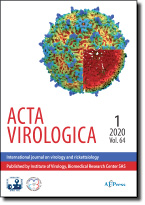Acta Virologica Vol.66, No.4, p. 324 – 331, 2022
|
| Title: RT-qPCR based determination of SARS-CoV-2 in health care workers, Cologne, Germany – A pre-delta/pre-omicron proof of principle field study |
| Author: Gina Spölgen, Jessica Lüsebrink, Verena Schildgen, Oliver Schildgen |
|
Abstract: The severe acute respiratory syndrome coronavirus 2 (SARS-CoV-2), causing coronavirus disease 2019 (COVID-19), and SARS-CoV-2 variants pose an increased risk to global health. Therefore, monitoring of SARS-CoV-2 variants of concern (VOCs) is of high importance for the implementation of disease control methods, for timely public health decisions, and the development of vaccines against SARS-CoV-2 variants. In this study, which was performed before the delta and omicron variants of concern became dominant, a total of 111 SARS-CoV-2 positive samples from our hospital staff in Cologne, Germany, collected from March 2020 to May 2021 were analysed for VOCs. For determination of VOCs, mutation genotyping analysis (MGA) using mutation-specific simple (MSS) probes based on quantitative reverse transcription-polymerase chain reaction (RT-qPCR) of ten spike protein variants (SPVs) was performed. The MGA focuses on the detection of the spike protein mutation (SPM) of SPVs belonging to VOCs. By successful determination of SPV, the work concludes that 24.66 % of the samples belong to VOC B.1.1.7 and 1.37 % of the samples belong to VOC B.1.351. Based on these results, MGA proves to be a suitable alternative to sequencing technologies as it is a rapid, cost-effective, widely available, and feasible method that allows high sample throughput for the determination of circulating and monitored SARS-CoV-2 VOCs. With focus on the novel variants such as SARS-CoV-2 omicron BA.4 and BA.5 similar approaches could be used for a rapid initial screening, while, however, due to the increasing number of single nucleotide polymorphisms that determine the variants of concern in depth screening becomes more cost efficient by next generation sequencing.
|
|
| Keywords: COVID-19; SARS-CoV-2; B.1.1.7; B.1.351; spike protein variation; mutation genotyping analysis; RT-qPCR |
|
|
Published online: 09-Dec-2022
|
| Year: 2022, Volume: 66, Issue: 4 |
Page From: 324, Page To: 331 |
doi:10.4149/av_2022_403
|
|
 download file download file |
|
|
|
|
 download file
download file
